- There are no upcoming events.
Recent Comments
No comments to show.
Weekly Quantum Group Webinar: Dr Latévi M. Lawson, Path integral in position deformed Heisenberg algebra
Title of talk: Path integral in position deformed Heisenberg algebra.
Speaker: Dr Latévi M. Lawson.
Abstract:
The deformed Heisenberg algebra is one of the promising candidate approaches to probe quantum gravity at the Planck scale. It consists of deforming the ordinary Heisenberg algebra in momentum or in position operators. Recently, we proposed in [1], a position deformed Heisenberg algebra in 2D with simultaneously existence of minimal and maximal length uncertainties. Its applications run from quantum well [2], quantum optics [3], quantum statistics [4] to quantum non-Hermitian operators [5].
More recently in [6], we have studied the effects of this deformation on the trajectories of a system moving from one point to another. As result, we have shown that this system can travel very faster in this deformed space with very low energies. As interpretation, this result can be understood as if deformation effects shorten the paths of the system, allowing it to move in this space in a short time using minimal kinetic energy.
[1] L. Lawson, Minimal and maximal lengths from position-dependent noncommutativity, J. Phys. A: Math. Theor. 53, 115303 (2020)
[2] L. Lawson, Position-dependent mass in strong quantum gravitational background fields, J. Phys. A: Math. Theor. 55, 105303 (2022)
[3] L. Lawson and P. Osei, Gazeau-Klauder coherent states in position-deformed Heisenberg algebra, J. Phys. Commun. 6, 085016 (2022)
[4] L. Lawson, Statistical description of ideal gas at Planck scale with strong quantum gravity measurement, Heliyon 8, e10564 (2022)
[5] L. Lawson, Minimal and maximal lengths of quantum gravity from non-Hermitian position-dependent noncommutativity, Scientific Reports 12, 20650 (2022)
[6] L. Lawson and P. Osei, K. Sodoga, F. Soglohu, Path integral in position deformed Heisenberg algebra with maximal length uncertainty, Annal of Phys doi:10.1016/j.aop.2023.169389 (2023)
Bio:
Dr Lawson is Togolese in nationality, residing in Ghana. He attended the University of Lomé, Togo (2006-2010) where he studied Physics and Chemistry. After three years of teaching Physics in secondary schools, he moved to IMSP (Institut de Mathématiques et de Sciences Physiques) in Benin, from 2013 to 2018, where he obtained an MSc and PhD in Mathematical Physics. He then returned to the University of Lomé and lectured as a teaching assistant in the Physics department for two years. In October 2020, he began Postdoctoral research and served as a tutor at AIMS in Ghana. His research interests are in noncommutative quantum mechanics, quantum groups, representation theory of differential operators and machine learning.
Weekly Quantum Group Webinar: Dr Garry Kemp, A generalized dominance ordering for 1/2-BPS states
Title of talk: A generalized dominance ordering for 1/2-BPS states.
Speaker: Dr Garry Kemp.
Abstract:
I discuss a generalized dominance ordering for irreducible representations of the symmetric group $S_{n}$ with the aim of distinguishing the corresponding states in the 1/2-BPS sector of $U(N)$ Super Yang-Mills theory when a certain finite number of Casimir operators are known. Having knowledge of a restricted set of Casimir operators was proposed as a mechanism for information loss in this sector and its dual gravity theory in AdS$_{5}\times S^{5}$. It is well-known that the states in this sector are labeled by Young diagrams with n boxes. I propose a generalization of the well-known dominance ordering of Young diagrams. Using this generalization, I posit a conjecture to determine an upper bound for the number of Casimir operators needed to distinguish between the 1/2-BPS states and thus also between their duals in the gravity theory. I offer numerical and analytic evidence for the conjecture. Lastly, I discuss implications of this conjecture when the energy $n$ of the states is asymptotically large.
Bio:
Dr Garry Kemp is a theoretical physicist and lecturer at the University of Johannesburg. He obtained his PhD at the University of the Witwatersrand working in high energy physics and AdS/CFT. He is also currently interested in quantum information in quantum field theory.
QWorld: Entangling Workshop for QSouthAfrica

We are pleased to announce the first QBronze Quantum Programming Workshop in the Republic of South Africa!
Join us for the introductory workshop “Quantum Computing and Programming” and learn the basics of quantum computing and how to write simple quantum programs.
Workshop Schedule:
Day 1 | Monday, July 3 – 18:30 (CEST)
Day 2 | Tuesday, July 4 – 18:30 (CEST)
Day 3 | Thursday, July 6 – 18:30 (CEST)
Day 4 | Friday, July 7 – 18:30 (CEST)
For further information and registration:
Tagged Quantum Computing, QWorld
Leave a comment
Group meeting
At today’s Group Meeting Chanelle will speak about
Qunatum Logistic Regression.
Her presentation will be based on the paper
Weekly Quantum Group Webinar: Alan Kahan, Structural crossovers in trapped ions dispersively coupled to optical cavities
Title of talk: Structural crossovers in trapped ions dispersively coupled to optical cavities.
Speaker: Alan Kahan.
Abstract:
We consider an optomechanical system composed of a trapped ion dispersively coupled to a single mode of a pumped optical cavity. We focus on a parameter range that exhibits bistability of different configurations in the semiclassical description. This semiclassical description, however, is not valid in close proximity to the system transitions or when the mean photon number is low. Here, we provide a numerical analysis of the fully quantum state in the few-photon regime, exploring the features of the asymptotic state across the transition and analyzing possible markers of semiclassical bistability. For larger mean photon numbers, we resort to an approach based on a truncated evolution in phase space. We compare the results of our techniques with the ones from numerical diagonalization of the quantum evolution and find that although the treatment leads to a smoothening and a slight shift of the transitions in the system, it still provides a clear improvement over localized semiclassical approximations.
Weekly Quantum Group Webinar: Dr Ahsan Nazir, Quantum work statistics at strong reservoir coupling
Title of talk: Quantum work statistics at strong reservoir coupling.
Speaker: Dr Ahsan Nazir (University of Manchester, United Kingdom).
Abstract:
Calculating the stochastic work done on a quantum system while strongly coupled to a reservoir is a formidable task, requiring the calculation of the full eigenspectrum of the combined system and reservoir. In this talk I will show that this issue can be circumvented by using a polaron transformation that maps the system into a new frame where weak-coupling theory can be applied. It is shown that the work probability distribution is invariant under this transformation, allowing one to compute the full counting statistics of work at strong reservoir coupling. Crucially this polaron approach reproduces the Jarzynski fluctuation theorem, thus ensuring consistency with the laws of stochastic thermodynamics. I will apply the formalism to a system driven across the Landau-Zener transition, where clear signatures in the work distribution arising from a non-negligible coupling to the environment are identified. These results provide a new method for studying the stochastic thermodynamics of driven quantum systems beyond Markovian, weak-coupling regimes.
Bio:
Ahsan Nazir is the Head of Theoretical Physics and Equality, Diversity, and Inclusion Lead within the Department of Physics and Astronomy at the University of Manchester. His group works on the theory of open quantum systems, quantum thermodynamics, solid-state quantum optics, and quantum electrodynamics, with a focus on the role of correlations, non-Markovianity, and strong coupling phenomena.
Register in advance for this meeting:
https://nithecs-ac-za.zoom.us/meeting/register/tJ0pdu2hpz0oGNGcsJaDrwZJG5cuV5K12XEc
The announcement can be found here
Italian honour for Prof Petruccione
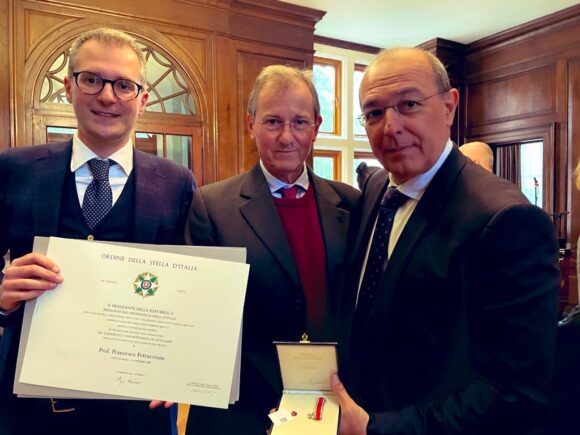
Prof. Francesco Petruccione was recently awarded the title of Cavaliere della Stella d’Italia, a prestigious Italian honour.. The accolade, presented by the Italian ambassador on Italy’s Republic Day, recognizes Petruccione’s significant global contributions to theoretical physics.
For the full press release, please follow this link.
Posted in Uncategorized
Leave a comment
Participation of one of our group members in the NYUAD International Hackathon Quantum Computing (AbuDhabi)
One of the Ph.D. students of the Quantum Research Group of Stellenbosch University, Abbas (Omid) Hassasfar, recently attended the Eleventh Annual NYUAD International Hackathon for Social Good focusing on Quantum Computing held at the New York University Abu Dhabi in Abu Dhabi, United Arab Emirate.
The quantum hackathon took place on April 27th – April 30th, 2023, and in partnership with IBM, NYUAD Center for Quantum and Topological Systems, Technology Innovation Institute (TII), Geneva Science and Diplomacy Anticipator (GESDA), qBraid, QWorld, NiEW, the MIT’s iQuHACK, and others.
This event was in person at the NYUAD campus over 3 days with nearly 200 students representing 56 universities from 24 countries. Professors around the world nominated their top students and Abbas was the only participant from a South African university in this event.
This exciting program was a collaboration aimed at bringing together students from different fields such as computer science, physics, and electrical engineering, and also technology experts, from different countries to foster a culture of innovation and entrepreneurship to solve a real-world problem and focus on the useful advantage (supremacy) of Quantum computer.
During the three days, participants worked in 15 different teams to suggest a problem and solution related to Sustainable Development Goals (SDGs) using a quantum computer and showing a quantum advantage.
We are proud to report that Abbas Hassasfar (who participated as a student/mentor in this hackathon) and his team won third prize for their project “Focus on Good Health & Wellbeing” which helps medical professionals with the early detection of malignant tumors in patients using quantum machine learning.
The experience was extremely motivating, allowing the students to cooperate with other specialists in the area, learn about the most recent breakthroughs in quantum computing, and work on projects with real-world implications. They also made long-lasting friendships with other participants and had a great time visiting Abu Dhabi.
The student expresses his gratitude to NiTheCS and New York University Abu Dhabi for providing him with this opportunity and looks forward to attending similar events in the future.
The event wraps up with a prize-giving: https://sites.nyuad.nyu.edu/hackathon/index.php/previous-hackathons/the-annual-nyuad-hackathon-for-social-good-in-the-arab-world-2023/2023-teams/
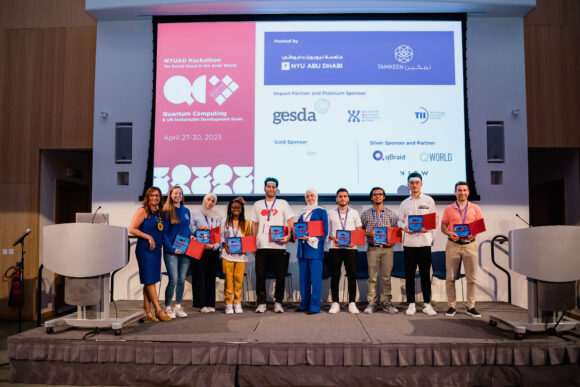
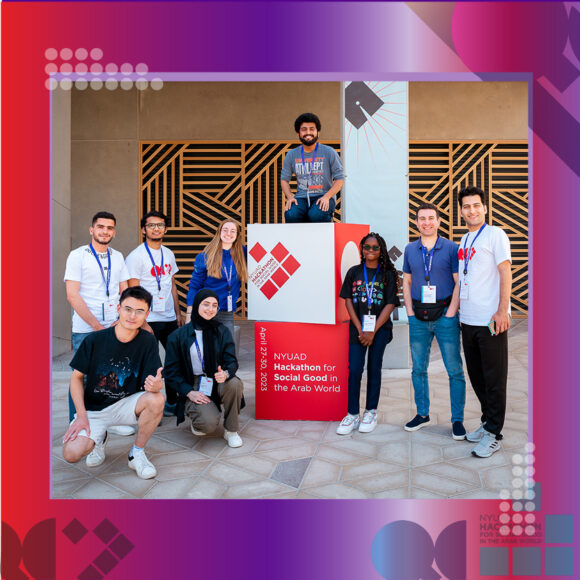
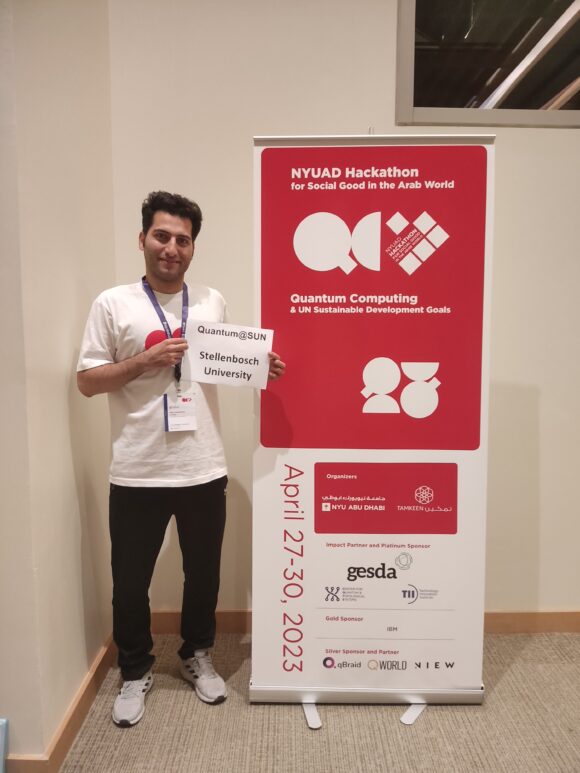
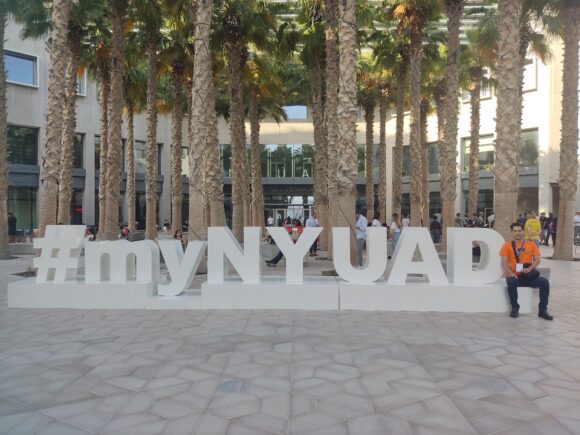
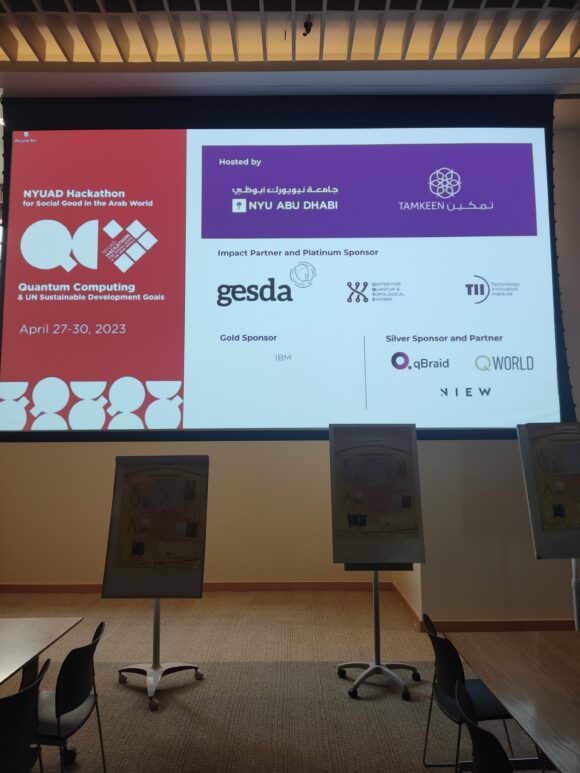
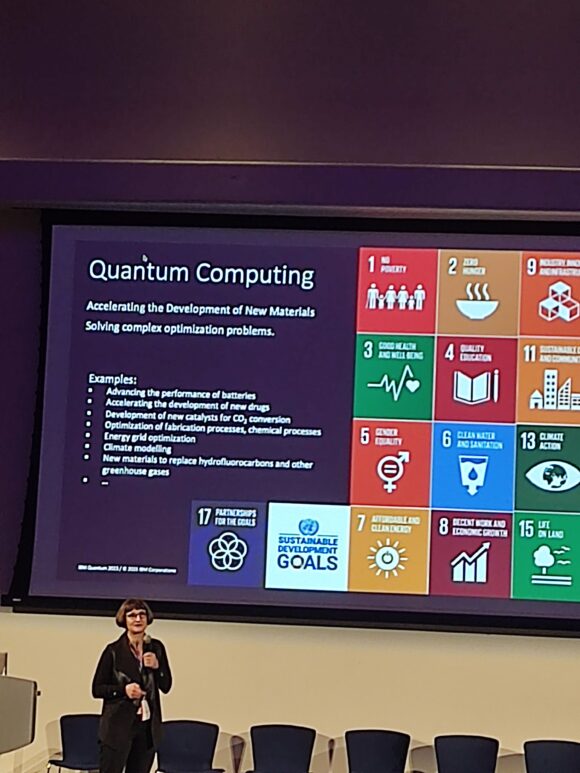
Posted in Uncategorized
Leave a comment

